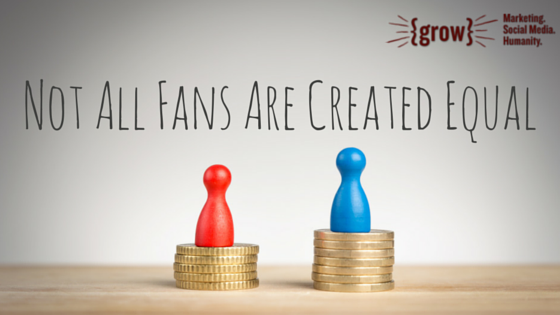By Brooke Ballard, {grow} Contributing Columnist
What if you were given $20,000 to acquire new fans on Facebook?
Sounds thrilling, right?
But is there strategy in trying to acquire new fans on Facebook? Or is it fruitless?
This conversation has come up in every corner of my life lately, most recently in a NYC networking group I belong to.
Just a few months ago I was begging for more Facebook ad dollars for my client accounts and our own unique page simply because Facebook said so.
I think too many of us got caught up in the pay-to-play news.
There’s no denying numbers matter. But let’s be real, shall we? Many marketers focus on vanity metrics — like follower counts and likes — which create a false sense of popularity or social proof.
I wouldn’t spend $20k on acquiring fans when the harder task is keeping them.
I wouldn’t spend $20k on acquiring fans when the most important task is converting them, or getting them to take the next step.
Why Do Numbers Sway Us?
On social media, we assume accounts with high follower counts are more trusted because, well, more people are following them.
Many of us have sucummbed to the social-celebrity and popularity contests that brag about buzz and other soft metrics.
In fact, most digital marketing and social media lists are made up of experts (sometimes that term seems to be used loosely) who have a large number of followers.
To my delight, some of the experts making these lists have challenged the very credibility of how the lists were determined; many times the “top” or “best of” were seemingly chosen just based on follower counts.
Please tell me you see how utterly insane that is.
Yet psychological factors force us to equate clout with numbers. We seek approval, recommendations, and cross-examination from the crowds.
In Mark’s just-released book, The Content Code, he shares a story in Chapter Five about the dysfunctional social media audience.
You’ll have to read the book for the entire message, but the biggest take away may be this line when he describes the dysfunctional approach to social media audience:
Don’t confuse audience size with action.
Does it make sense to spend so much time and money on a hollow number?
It’s A Vicious Cycle
I admit to sinking ad dollars into boosting posts when Facebook moved to a pay-to-play model.
All this really did was snag a little more Reach and few more fans.
Guess what? I then had to pay to keep those new fans engaged, too!
It’s a never-ending cycle of paying to acquiring fans, paying for fans to engage, and (attempting) to pay to move your content.
And if you know anything about Facebook ads, you know two things:
- The more fans you have the more your minimum boost dollar amount is
- The more fans you have the more you have to spend to keep them engaged
It’s a brilliant scheme.
Someone in my networking group mentioned that this advertising “strategy” is like being taxed twice on the same income.
And that’s when Chad Abbott, Partner at Abbson Studios, said something that totally resonates with me:
All fans are created unequal.
YES!
Chad went on to underscore the importance of qualifying fans, not just collecting them.
That’s the solution to this frustrating fan problem: using a combination of demographics and psychographics to target highly favorable, or ready-to-buy fans and prospects for your particular products and services.
Leveling The Playing Field
I’m not saying advertising is dead.
I’m saying you have to be smarter than the platform you’re advertising on, and that means knowing your audience inside and out.
One Facebook strategy that has been a boon for one of my consulting clients is retargeting, and custom or lookalike audiences.
I won’t go into the specifics of setting these up, but here are some resources:
The simple idea is to market your content or ads to a) people who are already familiar with your brand by using a pixel and targeting people who have visited your website or blog, or b) people who have a similar makeup as another one of your custom lists — such as your email subscribers.
This type of highly-targeted advertising may not make your potential fans completely equal, but it certainly moves you in the right direction.
Personally, I’d only spend a fraction of that $20k on retargeting strategies. Or advertising for that matter.
I think my marketing money is much better spent on the content that is most likely to attract, keep, and convert my potential prospects.
Don’t you?
What would you do with that $20k if you were asked to use it to acquire Facebook fans? I’m curious! Let me know in the comments section below.
See you in the social sphere!
